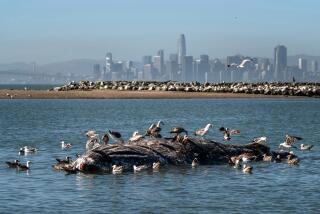ENVIRONMENT : Protests Growing at Marine-Mammal Parks : Animal rights groups say dolphins, whales are exploited. Aquariums fight back in court, point to educational benefits.
- Share via
MIAMI — For seven years, Richard O’Barry trained captive dolphins to perform as leaping acrobats and aquatic clowns, and in the 20 years since he has been trying to make amends.
“I helped create a billion-dollar industry for what I call these abusement parks,” he says. “I’m definitely operating from guilt.”
O’Barry, 51, head trainer for the popular “Flipper” television show in the late 1960s, is perhaps the best known of a growing number of activists determined to end what they call the exploitation of marine mammals such as dolphins and whales. In August, the United Nations cited the oft-arrested O’Barry as one of the country’s top environmentalists.
Those who run aquariums and theme parks featuring marine mammals, however, view many animal rights activists as misguided zealots. George Boucher, president of Ocean World in Ft. Lauderdale, Fla., dismisses O’Barry as a self-promoter interested chiefly in selling his book, “Behind the Dolphin Smile.”
“He hasn’t worked in 20 years, and he has no credentials,” said Boucher, whose park was slapped with 11 violations involving the care of dolphins after protests by O’Barry and others last summer.
Brad Andrews, zoological director of Sea World’s four parks, charges O’Barry and other activists with trading in misinformation to advance “a minority, elitist position . . . that no animals should be in a captive environment.”
But, in the decade ahead, “more attention (will be) focused on whether these cetaceans (whales and dolphins) should be in captivity at all,” said Ken Johnson, field investigator for the Humane Society of the United States.
Confrontations have escalated just this year. The New England Aquarium in Boston recently filed a $5-million defamation suit against three animal rights groups, alleging that false statements about the aquarium’s treatment of dolphins were made to promote fund-raising activities.
In Orlando, Sea World was targeted by protesters in August after the death of a pregnant whale.
Several animal rights groups called for a boycott of Sea World’s four parks--including one in San Diego--as well as the products of its corporate owner, Anheuser-Busch Cos. Inc.
Ocean World went to court to obtain a restraining order preventing O’Barry from coming onto its grounds.
O’Barry, in turn, has filed a $10-million lawsuit against two U.S. Navy subcontractors for allegedly roughing him up last year when he sat on a buoy in an effort to stop a bomb test in dolphin-populated waters off the Florida Keys.
Behind these eco-protests and legal skirmishes are fundamental philosophical differences about keeping intelligent animals in captivity.
With dolphins, emotions run especially high. The Atlantic bottlenose dolphin has been displayed for at least 80 years. About 450 are now in captivity in the United States and in several other countries. About 40% of those are in Florida, in marine parks, in swim-with-the-dolphins attractions or in resort hotels.
Marine parks such as Ocean World and Sea World defend keeping dolphins in captivity as educational. “We give the public an opportunity to see these beautiful creatures and increase their sensitivity to those in the wild,” Boucher said.
O’Barry doesn’t buy the education argument. “What is the educational value,” he asks, “of holding dolphins in a chlorinated concrete box? Some of these animals have never seen the sky and don’t behave as dolphins. They are victims.”
O’Barry concedes that there is “a justification for some creatures to be in zoos and aquariums to save the species from extinction.”
But dolphins are not a threatened species, and training dolphins to leap through hoops and teaching orca whales to give piggy-back rides “may amuse and titillate, but it doesn’t educate,” he said.
The future, O’Barry said, can be seen at the Monterey Bay Aquarium, which has no cetaceans, or outside Paris at the Cousteau Society’s marine park, which has no live animals or water.
Protests over conditions in parks are likely to continue. Eight-five activists demonstrated Saturday in Ft. Lauderdale, on what they called Marine Mammal Freedom Day, to protest Ocean World’s handling of dolphins.
Similar protests were held that day outside the New England Aquarium and at several other aquariums around the country.
More to Read
Sign up for Essential California
The most important California stories and recommendations in your inbox every morning.
You may occasionally receive promotional content from the Los Angeles Times.













